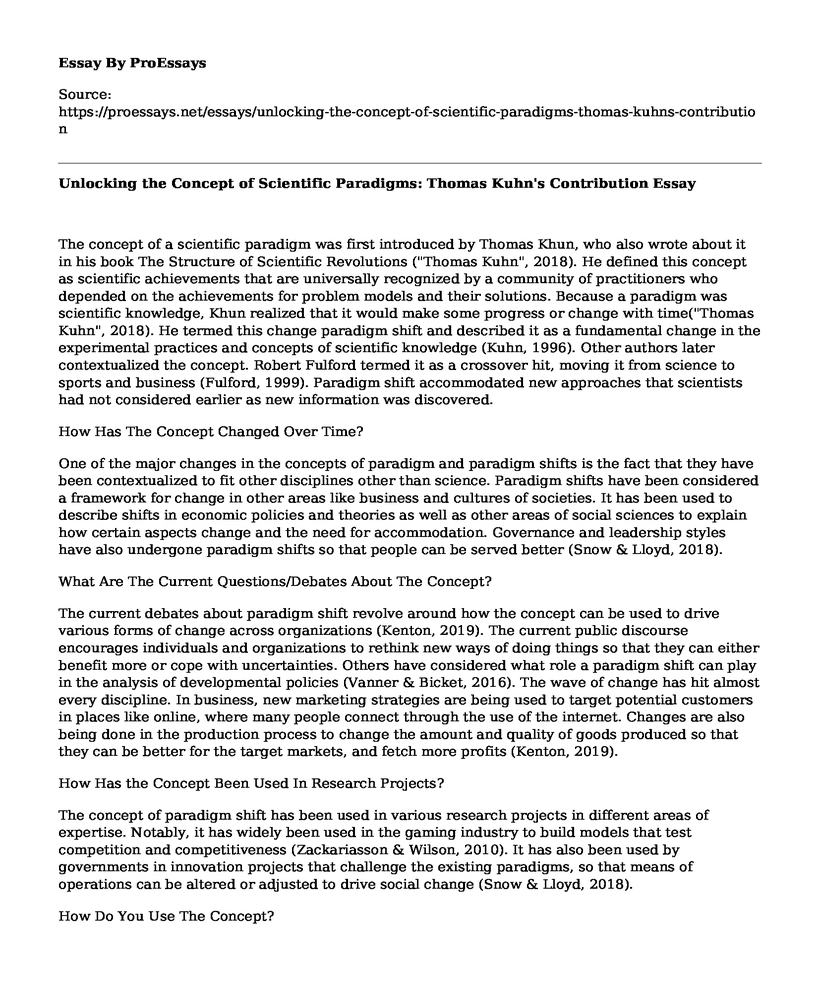The concept of a scientific paradigm was first introduced by Thomas Khun, who also wrote about it in his book The Structure of Scientific Revolutions ("Thomas Kuhn", 2018). He defined this concept as scientific achievements that are universally recognized by a community of practitioners who depended on the achievements for problem models and their solutions. Because a paradigm was scientific knowledge, Khun realized that it would make some progress or change with time("Thomas Kuhn", 2018). He termed this change paradigm shift and described it as a fundamental change in the experimental practices and concepts of scientific knowledge (Kuhn, 1996). Other authors later contextualized the concept. Robert Fulford termed it as a crossover hit, moving it from science to sports and business (Fulford, 1999). Paradigm shift accommodated new approaches that scientists had not considered earlier as new information was discovered.
How Has The Concept Changed Over Time?
One of the major changes in the concepts of paradigm and paradigm shifts is the fact that they have been contextualized to fit other disciplines other than science. Paradigm shifts have been considered a framework for change in other areas like business and cultures of societies. It has been used to describe shifts in economic policies and theories as well as other areas of social sciences to explain how certain aspects change and the need for accommodation. Governance and leadership styles have also undergone paradigm shifts so that people can be served better (Snow & Lloyd, 2018).
What Are The Current Questions/Debates About The Concept?
The current debates about paradigm shift revolve around how the concept can be used to drive various forms of change across organizations (Kenton, 2019). The current public discourse encourages individuals and organizations to rethink new ways of doing things so that they can either benefit more or cope with uncertainties. Others have considered what role a paradigm shift can play in the analysis of developmental policies (Vanner & Bicket, 2016). The wave of change has hit almost every discipline. In business, new marketing strategies are being used to target potential customers in places like online, where many people connect through the use of the internet. Changes are also being done in the production process to change the amount and quality of goods produced so that they can be better for the target markets, and fetch more profits (Kenton, 2019).
How Has the Concept Been Used In Research Projects?
The concept of paradigm shift has been used in various research projects in different areas of expertise. Notably, it has widely been used in the gaming industry to build models that test competition and competitiveness (Zackariasson & Wilson, 2010). It has also been used by governments in innovation projects that challenge the existing paradigms, so that means of operations can be altered or adjusted to drive social change (Snow & Lloyd, 2018).
How Do You Use The Concept?
It is crucial to analyze the historical aspects of frameworks, projects, research, governments, policies and many others to ascertain their levels of success and failure, to know what to change and what to leave intact. Changing certain things can be disastrous while also adjusting can also be helpful. In every aspect of personal learning and doing things, I tend to be flexible and accommodative in dealing with issues, people, or ideas. This tendency has promoted understanding and made many aspects of my life better. From a scientific perspective, foundational knowledge is fundamental in any kind of future progress; however, science should allow revisions and conception of new knowledge. This is the reason why I am a proponent and an applicator of the concepts of paradigm and paradigm shift.
References
Fulford, R. (1999). Robert Fulford's column about the word paradigm. Robertfulford.com. Retrieved 23 April 2020, from http://www.robertfulford.com/Paradigm.html.
Kenton, W. (2019). Why Paradigm Shifts Matter. Investopedia. Retrieved 23 April 2020, from https://www.investopedia.com/terms/p/paradigm-shift.asp.
Kuhn, T. (1996). The structure of scientific revolutions (3rd ed.). University of Chicago Press.
Snow, T., & Lloyd, J. (2018). The truth is, nothing is true: how paradigm shifts can drive social change. Apolitical. Retrieved 23 April 2020, from https://apolitical.co/en/solution_article/paradigm-shift-social-change.
Thomas Kuhn. Plato.stanford.edu. (2018). Retrieved 23 April 2020, from https://plato.stanford.edu/entries/thomas-kuhn/#ConcPara.
Vanner, R., & Bicket, M. (2016). The Role of Paradigm Analysis in the Development of Policies for an Efficient Resource Economy. Sustainability, 8(7), 645. https://doi.org/10.3390/su8070645Zackariasson, P., & Wilson, T. (2010). Paradigm shifts in the video game industry. Competitiveness Review, 20(2), 139-151. https://doi.org/10.1108/10595421011029857
Cite this page
Unlocking the Concept of Scientific Paradigms: Thomas Kuhn's Contribution. (2023, May 30). Retrieved from https://proessays.net/essays/unlocking-the-concept-of-scientific-paradigms-thomas-kuhns-contribution
If you are the original author of this essay and no longer wish to have it published on the ProEssays website, please click below to request its removal:
- Risks and Rewards of Alternate Delivery Methods
- Effects of Transportation Infrastructure on International Trade Logistics
- The International Business Environment Paper Example
- Essay Example on US Trade War: Chinese Economy at Risk?
- Research Paper on NATO's Air Campaign in Kosovo
- Essay Example on Maximizing Military Logistics Efficiency in Changing Contexts
- Dr. Birx Warns Predictions of Coronavirus Extremely High







